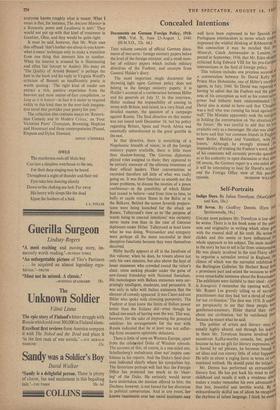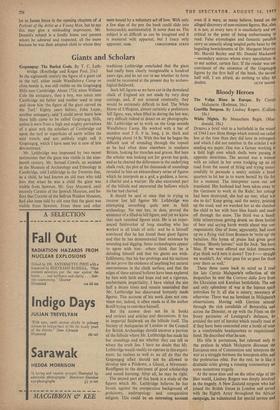Self-Portraits
UNLIKE most painters Mr. Trevelyan is lost when he writes. There is in his book none of the pre°. sion and originality in writing which often goes with the manual skill of his craft. He writes clichés and this seems to have influenced 1115 whole approach to his subject. The main incidee', iu the story he has to tell is far from uninteresting', He was closely involved in the mid-Thirty go° to organise a surrealist revival in England, the climax of which was the surrealist exhibition in the Burlington Galleries.'Sir Herbert Read tool( a prominent part and seized the occasion to virile some remarkable nonsense about the Renaissance,' The exhibitors were faithful to their ideal: epalect' k bourgeois. I remember the opening well, an Mr. Rupert Lee gravely telling us of surrealist practitioners that they had 'not a shred of respect for our civilisation.' The date was 1936. It needed A no perspicacity to see that these people wet: gentleman-amateurs. Hitler shared their view about our civilisation, but he outclassed there because he meant what he said. The politics of artists and literary men are usually highly absurd, and through his interest in them Mr. Trevelyan became involved in monstrous Kafka-worthy comedy, but, perliePtis because he has no gift for literary expression, an is bound by set phrases, he becomes bound AVY set ideas and can convey little of what happened' He tells us about a raging farce in terms of coil' ventional outlook. He should paint the subject., Mr. Dennis has performed an extraordineu,' literary feat. He has put back his mind to Call childhood and recalls it with a vividness whic, makes a reader remember his own adventures 5,t that lost, beautiful and terrible world. By a., extraordinarily skilful use of idiom he recaptut% the rhythms of infant language. I think he owes' lot to James Joyce in the opening chapters of A Portrait of the Artist as a Young Man, but to say this may give a misleading impression. Mr. Dennis's subject is a kindly home and parents whom he admired and respected, all the more because he was their adopted child to whom they were bound by a voluntary act of love. With only a few slips of the pen the book could slide into honeysuckle sentimentality. It never does so. The subject is as difficult as can be imagined and it is mastered with apparent, but I fancy only































 Previous page
Previous page